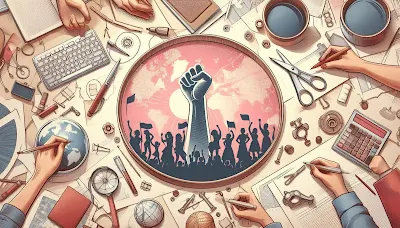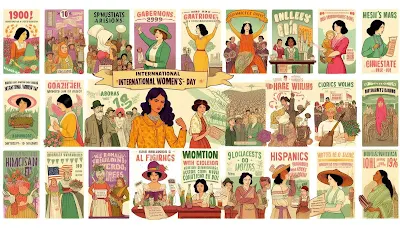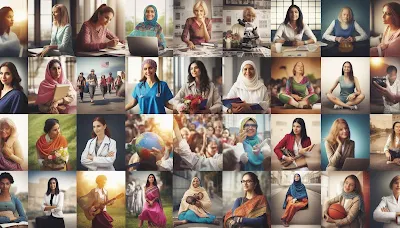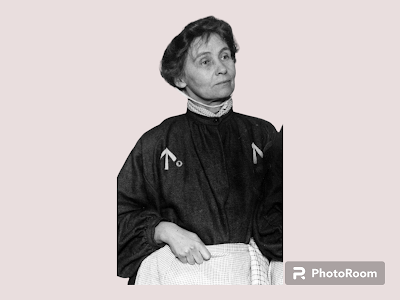March 8th marks International Women's Day, a day dedicated to celebrating the achievements and contributions of women around the world. This annual celebration has been observed for over a century and is a reminder of the progress made towards gender equality, as well as the work that still needs to be done. The history of International Women's Day is rich with stories of strong and resilient women who fought for their rights and paved the way for future generations. From the suffragettes who fought for women's right to vote, to the modern-day activists advocating for pay equality and an end to gender-based violence, International Women's Day is a celebration of their strength and determination. In this article, we will take a closer look at the history of International Women's Day and the remarkable women who have made it possible. Join us as we celebrate the achievements of these incredible women and their ongoing fight for gender equality.
The Origins of International Women's Day
International Women's Day has its roots in the early 20th century, when women in many countries were beginning to organize and agitate for their rights. In the United States, the first National Woman's Day was observed on February 28, 1909, in honor of a garment workers' strike in New York City the previous year. The idea quickly spread to other countries, and by 1911, International Women's Day was celebrated in Austria, Denmark, Germany, and Switzerland.
The date of March 8th was established in 1913, and it has been the official date of International Women's Day ever since. The choice of March 8th was significant, as it was already a day of celebration for women in Russia, who marked the occasion with rallies and demonstrations. In 1917, Russian women again took to the streets on March 8th to protest against the war and demand food and peace. This event is often cited as the inspiration for the modern-day International Women's Day.
International Women's Day was initially focused on women's suffrage and the right to vote, but it quickly evolved to encompass a broader range of women's issues. During the 1910s and 1920s, International Women's Day was a time for women to come together and demand better working conditions, equal pay, and an end to discrimination. Today, International Women's Day is celebrated around the world as a day of solidarity, activism, and celebration.
The Historical Significance of International Women's Day
International Women's Day has played a significant role in the fight for women's rights and gender equality. It has been a platform for women to demand change and has helped to raise awareness of the issues facing women around the world. Some of the most significant moments in the history of International Women's Day include:
1917: Russian Women's Strike
As mentioned earlier, the Russian women's strike in 1917 is often cited as the inspiration for International Women's Day. The strike was organized to protest against the war and demand food and peace. It was a pivotal moment in the Russian Revolution and helped to establish women's rights in the new Soviet state.
1975: International Women's Year
In 1975, the United Nations declared International Women's Year, and International Women's Day took on a new level of significance. The year was dedicated to raising awareness of women's issues and promoting gender equality around the world.
1995: Beijing Declaration and Platform for Action
The Beijing Declaration and Platform for Action was adopted at the Fourth World Conference on Women in Beijing in 1995. It is a landmark document that sets out a global agenda for women's rights and gender equality. International Women's Day has played a significant role in promoting the goals of the Beijing Declaration and has helped to raise awareness of the issues it addresses.
The Evolution of International Women's Day
International Women's Day has evolved over the years to become a global celebration of women's achievements and a call to action for gender equality. In the early days, it was primarily focused on suffrage and the right to vote, but it quickly expanded to encompass a broader range of women's issues.
During the 1970s and 1980s, International Women's Day was a time for women to come together and demand equal pay, better working conditions, and an end to discrimination. In recent years, the focus has shifted to issues such as gender-based violence, reproductive rights, and women's leadership.
International Women's Day has also become a platform for women to share their stories and experiences. Social media has played a significant role in this, with hashtags such as #MeToo and #TimesUp helping to raise awareness of the prevalence of harassment and assault.
How International Women's Day is Celebrated Around the World
International Women's Day is celebrated in different ways around the world, but the message is always one of solidarity, activism, and celebration. Some of the most common ways to celebrate International Women's Day include:
Marches and Demonstrations
Marches and demonstrations are a common way to mark International Women's Day. These events are often organized by women's groups and are an opportunity to demand change and raise awareness of women's issues.
Conferences and Workshops
Conferences and workshops are another way to celebrate International Women's Day. These events bring together women from different backgrounds and provide a space for discussion and learning.
Art Exhibitions and Performances
Art exhibitions and performances are a creative way to celebrate International Women's Day. These events showcase the work of women artists and performers and help to raise awareness of women's issues.
Fundraisers and Charity Events
Fundraisers and charity events are a way to support organizations that are working to empower women and promote gender equality. These events can take many forms, from charity runs to bake sales.
The Role of Women in Society Today
Women have made significant progress in the fight for gender equality, but there is still much work to be done. Women continue to face discrimination and inequality in many areas of life, including the workplace, education, and politics.
Despite these challenges, women are making their voices heard and demanding change. Women are breaking down barriers and taking on leadership roles in all areas of society. Women are also using their platforms to raise awareness of women's issues and demand action.
Celebrating Strong Women - A Tribute to Female Leaders and Pioneers
International Women's Day is a time to celebrate the achievements of strong and resilient women who have made a difference in the world. From suffragettes to modern-day activists, women have been at the forefront of the fight for gender equality.
Some of the most inspiring women in history include:
Emmeline Pankhurst
Emmeline Pankhurst was a British suffragette who fought for women's right to vote. She was the founder of the Women's Social and Political Union and led a campaign of civil disobedience that included hunger strikes and arson attacks. Her tireless efforts helped to secure the right to vote for women in the UK.
Malala Yousafzai
Malala Yousafzai is a Pakistani activist who advocates for girls' education. She was shot by the Taliban in 2012 for her activism but survived and went on to become a global advocate for women's rights. She was awarded the Nobel Peace Prize in 2014.
Ruth Bader Ginsburg
Ruth Bader Ginsburg was an American lawyer and jurist who served as an Associate Justice of the Supreme Court of the United States. She was a champion of gender equality and women's rights and played a significant role in many landmark cases.
The Importance of Gender Equality and Women's Empowerment
Gender equality and women's empowerment are essential for building a more just and equal world. When women are empowered, they can contribute to their families, communities, and societies in meaningful ways. They can also advocate for their rights and demand change.
Gender equality is not just a women's issue - it is a human rights issue. Everyone has a role to play in promoting gender equality and challenging discrimination. By working together, we can create a world where everyone has the opportunity to reach their full potential, regardless of their gender.
How to Get Involved in International Women's Day
International Women's Day is a chance to celebrate the achievements of women and demand change. There are many ways to get involved, including:
Attend an Event
Check your local community calendar for events happening in your area. Marches, demonstrations, and other events are a great way to show your support for women's rights.
Donate to a Women's Organization
Consider donating to a women's organization that is working to promote gender equality and women's empowerment. Your donation can make a significant difference in the lives of women around the world.
Share Your Story
Social media has made it easier than ever to share your story and raise awareness of women's issues. Use hashtags like #InternationalWomensDay or #EachforEqual to join the conversation and make your voice heard.
Conclusion
International Women's Day is a time to celebrate the achievements of women and demand change. It is a reminder of the progress made towards gender equality and the work that still needs to be done. From the suffragettes who fought for women's right to vote to the modern-day activists advocating for pay equality and an end to gender-based violence, International Women's Day is a celebration of their strength and determination. Let us continue to celebrate the achievements of these incredible women and work towards a world where everyone has the opportunity to reach their full potential, regardless of their gender.









Comments
Post a Comment
Welcome To Women Steps.